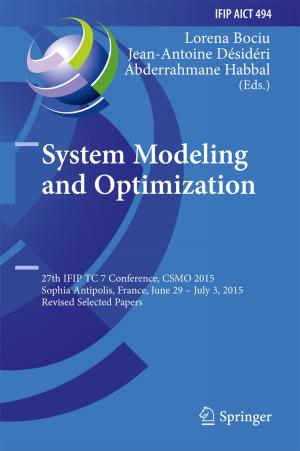Organic Computing – Technical Systems for Survival in the Real World
Nonfiction, Computers, Advanced Computing, Artificial Intelligence, Programming, Software Development, General Computing| Author: | Christian Müller-Schloer, Sven Tomforde | ISBN: | 9783319684772 |
| Publisher: | Springer International Publishing | Publication: | December 28, 2017 |
| Imprint: | Birkhäuser | Language: | English |
| Author: | Christian Müller-Schloer, Sven Tomforde |
| ISBN: | 9783319684772 |
| Publisher: | Springer International Publishing |
| Publication: | December 28, 2017 |
| Imprint: | Birkhäuser |
| Language: | English |
This book is a comprehensive introduction into Organic Computing (OC), presenting systematically the current state-of-the-art in OC. It starts with motivating examples of self-organising, self-adaptive and emergent systems, derives their common characteristics and explains the fundamental ideas for a formal characterisation of such systems. Special emphasis is given to a quantitative treatment of concepts like self-organisation, emergence, autonomy, robustness, and adaptivity. The book shows practical examples of architectures for OC systems and their applications in traffic control, grid computing, sensor networks, robotics, and smart camera systems. The extension of single OC systems into collective systems consisting of social agents based on concepts like trust and reputation is explained. OC makes heavy use of learning and optimisation technologies; a compact overview of these technologies and related approaches to self-organising systems is provided.
So far, OC literature has been published with the researcher in mind. Although the existing books have tried to follow a didactical concept, they remain basically collections of scientific papers. A comprehensive and systematic account of the OC ideas, methods, and achievements in the form of a textbook which lends itself to the newcomer in this field has been missing so far. The targeted reader of this book is the master student in Computer Science, Computer Engineering or Electrical Engineering - or any other newcomer to the field of Organic Computing with some technical or Computer Science background. Readers can seek access to OC ideas from different perspectives: OC can be viewed (1) as a „philosophy“ of adaptive and self-organising - life-like - technical systems, (2) as an approach to a more quantitative and formal understanding of such systems, and finally (3) a construction method for the practitioner who wants to build such systems. In this book, we first try to convey to the reader a feeling of the special character of natural and technical self-organising and adaptive systems through a large number of illustrative examples. Then we discuss quantitative aspects of such forms of organisation, and finally we turn to methods of how to build such systems for practical applications.
This book is a comprehensive introduction into Organic Computing (OC), presenting systematically the current state-of-the-art in OC. It starts with motivating examples of self-organising, self-adaptive and emergent systems, derives their common characteristics and explains the fundamental ideas for a formal characterisation of such systems. Special emphasis is given to a quantitative treatment of concepts like self-organisation, emergence, autonomy, robustness, and adaptivity. The book shows practical examples of architectures for OC systems and their applications in traffic control, grid computing, sensor networks, robotics, and smart camera systems. The extension of single OC systems into collective systems consisting of social agents based on concepts like trust and reputation is explained. OC makes heavy use of learning and optimisation technologies; a compact overview of these technologies and related approaches to self-organising systems is provided.
So far, OC literature has been published with the researcher in mind. Although the existing books have tried to follow a didactical concept, they remain basically collections of scientific papers. A comprehensive and systematic account of the OC ideas, methods, and achievements in the form of a textbook which lends itself to the newcomer in this field has been missing so far. The targeted reader of this book is the master student in Computer Science, Computer Engineering or Electrical Engineering - or any other newcomer to the field of Organic Computing with some technical or Computer Science background. Readers can seek access to OC ideas from different perspectives: OC can be viewed (1) as a „philosophy“ of adaptive and self-organising - life-like - technical systems, (2) as an approach to a more quantitative and formal understanding of such systems, and finally (3) a construction method for the practitioner who wants to build such systems. In this book, we first try to convey to the reader a feeling of the special character of natural and technical self-organising and adaptive systems through a large number of illustrative examples. Then we discuss quantitative aspects of such forms of organisation, and finally we turn to methods of how to build such systems for practical applications.















